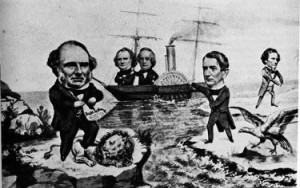The Baptist press of the Confederacy is aflutter at the possibility of England declaring war on the United States, a prospect brought about by a blundering U.S. naval action.
Known as the Trent Affair, named after the British ship on which the action transpired, the incident centers on the United States’ arrest of Confederate commissioners, James M. Mason and John Slidell.
Mason and Slidell had been sent to solicit the support of England and France for the Confederacy. The Confederate States, in need of both trade and weaponry, hoped to score a coup by forming alliance with the two currently neutral European powers. Indeed, southern cotton had long been in demand in Europe.
On November 8, 1861, Captain Charles Wilkes, commanding the Union frigate San Jacinto, seized Mason and Slidell from the neutral British ship Trent. In the ensuing weeks, the outcry from the South and indignant English officials has raised the distinct possibility of England declaring war on the United States, in which case a Confederate victory over the U.S. would suddenly seem very likely.
Working feverishly to quell the crisis, the Lincoln administration is close to resolving the problem by meeting English demands for the release of the two Confederate officials. Meanwhile, however, southerners are fervently hoping that England will yet declare war on the U.S.
In the minds of many southerners, the hand of God is evidenced in this turn of events that at the moment seem highly favorable to Confederate prospects. Portions of an editorial in the Richmond Examiner make the rounds of some Baptist newspapers of the South:
Spectators of these events [war events thus far favorable to the Confederacy], who can doubt that the Almighty Fiat that has gone forth against the American Union, or that the Southern Confederacy is decreed by the Divine Wisdom? The dullest worldling, the coolest atheist, the most hardened cynic, might be struck with awe by the startling and continual interposition, of a power beyond the control or cognizance of men, in these affairs. The incidents of this struggle are so unparalleled, unexpected, and unaccountable on other grounds, it is impossible to avoid the conclusion that the acts of men and nations are now submitted to a superior hand. Had but one such event occurred, it might be reckoned an ordinary chance. But each has been followed by another more wonderful than its predecessor; while they all have an identical tendency, and more forward, by inexorable sequence, to the same gaol [goal]. None of them, however, and indeed no miracle of man’s history, is more singularly distinguished from the common contingencies of earthly transactions, than the arrest of those two Ministers on the mid-ocean. Who thought when the Trent was announced to sail, that on its deck and in the trough of the weltering Atlantic, the key of the blockade would be lost? Who dreamed that the chief element in the strife would enter from that unnoticed door? The Hand of God was here visibly extended over the world; men sink to puppets, their works are naught, their intelligence, turns into folly.
The self-congratulatory language is, of course, premature. In the coming days, the Lincoln administration successfully navigates through this early incident that could have decidedly tipped the scales in favor of the Confederacy. It will not be the last time that a turning point for the Confederacy looms near, only to dissipate before it can be realized.
Sources: “The Trent Affair” (link); “God on Our Side,” Biblical Recorder, December 25, 1861 (link); Mark Grimsley, “Net Assessment During the Trent Affair,” including image (link)



